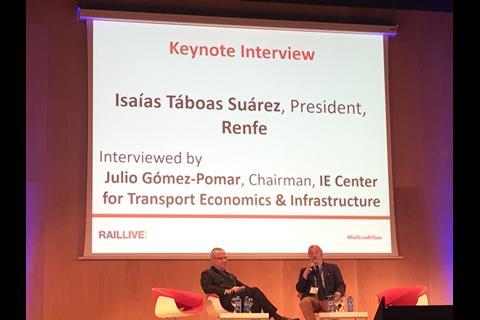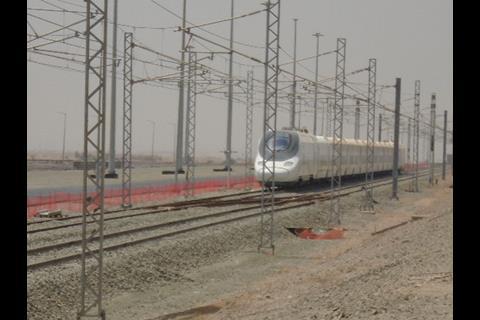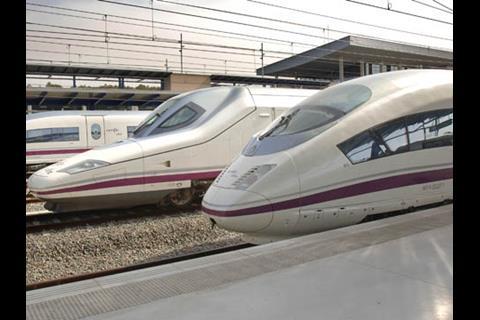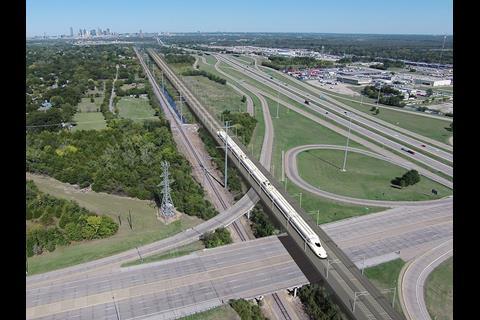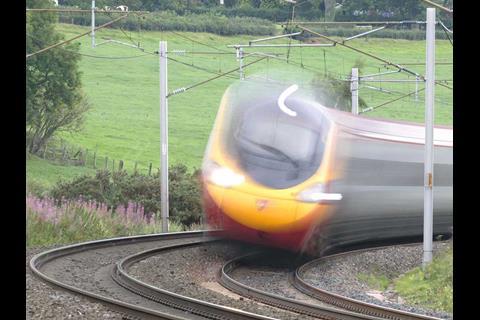SPAIN: RENFE will be adopting an ‘unprecedented and pro-active’ approach to international expansion as its domestic market faces more liberalisation under the EU’s Fourth Railway Package, the Spanish incumbent’s President Isaías Táboas Suárez told the Rail Live trade show in Bilbao on March 6.
Suárez highlighted RENFE’s participation in the Haramain High Speed Rail programme in Saudi Arabia since 2011 as evidence that the company could win business outside Spain, but he suggested that such opportunities had not until now been pursued ‘strategically’. In the future, the company would be looking to work ‘with Spanish and international partners’ to identify opportunities to develop new rail corridors, especially where Spain’s expertise in high speed rail could be utilised. RENFE is already acting as ‘shadow operator’ of the planned Texas Central high speed line in the USA and is bidding for the West Coast Partnership franchise in the UK alongside MTR Corp and Guangshen Railway Co of China.
However, he emphasised that the expansion programme would not be focused solely on high speed rail, and that RENFE would compete ‘across Europe’ to operate competitively tendered passenger services.
RENFE needs ‘a change of mindset’, Suárez believed, adding that ‘many countries are asking us to help with the development of their railways’, notably in South and Central America.
Recognising the ‘challenge’ of liberalisation at home, he likened opening of the domestic passenger market to competition in 2020 to the opening of Spain’s inaugural high speed line in 1992. ‘We are not afraid of competition. As with the first high speed line, this is our opportunity to push to next level with more quality, more innovation and better internal processes.’
Suárez suggested that RENFE would continue to act as a ‘proving ground for railway innovation’, but said this must have a broader scope than in the past, when innovation often meant testing new rolling stock designs. The company is ‘actively looking for new approaches to the rail mode’, and has joined forces with telecoms group Téléfonica to call tenders for a start-up accelerator with a specific focus on rail applications. He called on the Spanish government to allocate specific grant funding to railway research activity, just as it has in other sectors, and said this should be aimed at the ‘diverse but dispersed’ network of rail supply SMEs.
Reflecting on the prospect of on-rail competition, he suggested that any new entrant would target routes where ‘people know RENFE earns money’. These included the high speed rail routes linking Madrid with Barcelona, Valencia and Sevilla. But RENFE’s cost base is still too high, he added, suggesting that a low-cost service would be the only way to increase its share of the Madrid - Barcelona transport market beyond the 39% achieved today. ‘Many people are still happy to drive for 6 h because it’s cheap if you avoid the toll motorways. We have to address that.’
More broadly, he emphasised that reducing costs would be ‘good for the travelling public and good for the state, since we are public company’. But it would also ensure that ‘when the competitors arrive, RENFE is not asleep’.















